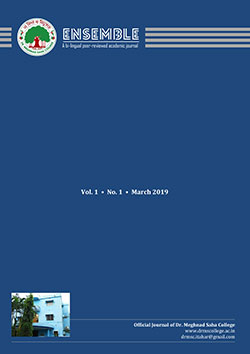Growth and Development of Postal Communication in Colonial Bengal with Special Emphasis on Dinajpur: A Historical Review
Abstract
The development of correspondence mainly postal communication connects the whole world in a communication network. Before the introduction of internet services, postal system was the lifeline of the people at large. When people began to spread out, there was a need for indirect communication and only at that time the concept of messenger came into existence. It is noteworthy to mention here that this vast communication system had been properly developed by the colonial masters from Bengal.
When the human kind began to develop or organize into large groups or States, it was found to be essential for maintaining communication of orders or news between the central administration and its far-flung parts. The seeds of the present post office had their origin in state services maintained purely for state purposes. The postal communication exists from ancient age and the evidences of existence of earliest postal system in the subcontinent were found in the Atharva Veda. It is a fact that like all other civilization the system of exchange of information was available in Bengal. Literary sources and folk tales as well as rhymes, however, reveal that the messengers and different animals and birds were used to send messages from one place to another.
Initially, the East India Company started their postal communication system for their personal works and wanted to communicate between various business offices of Bengal including Dinajpur district. It was their necessity to ensure the routes of communication between the trading centres of Calcutta and those of Dhaka, Chittagong, Dinajpur, Rajmahal, Rajshahi, Rangpur and Murshidabad.Clive wanted to establish well communication system between Calcutta and Dinajpur. Because Dinajpur had a strong zamindari system and the king of Dinajpur collects huge revenue from the tenants and sent it to the company’s treasury.In Bengal there was only native daks known as Nizamat Dak. But, this Nizamat Dak was abolished by the Government in 1838. Thereafter, an integrated postal system has been introduced which exists till date.
Postal service in the rural areas not only ensures the delivery of letters, parcels and money orders at the door, but also provides basic local needs of the people like banking and insurance services. There was a huge complaints also made by public in relation to the vast amount of business which the post office transacts. The colonial post office was more anxious to receive complaints founded on well ascertained facts, as there was a tendency to detect any fault lying in the system and the authority was ready to upgrade the system if necessary.
Key Words:Anna, Banghy, Dak, District, Imperial, Sarai, Zamindar
https://doi.org/10.37948/ensemble-2021-0301-a024
Views: 2035



